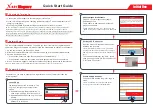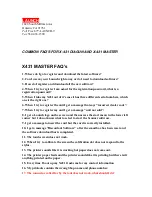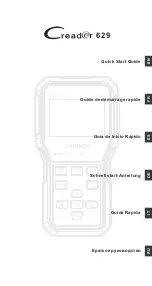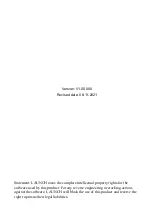
LITE G3 CHUCK
QUICK START
INSTRUCTION
MANUAL
Thank you for purchasing the NOVA LITE G3 Chuck
–
a new addition to our NOVA woodturning
chuck range with advanced features to enhance your chuck performance. It provides a
versatile and easy method for fast and secure work holding for all face turning
–
bowls,
egg cups, vases, boxes, goblets and an endless variety of similar projects.
OPENING AND CLOSING OF JAWS
MOUNTING THE LITE G3 CHUCK
ON THE LATHE
There are two configurations available for the LITE G3 chuck:
•
Insert model: Requires an insert for chuck to be mounted on the lathe. See full manual
online for a list of lathe spindle thread inserts available.
•
Direct Thread model: Threads directly on the spindle directly
available in M33 and 1”8TPI.
1.
If the chuck is an insert model,
ensure the insert is fully seated in
the chuck body before mounting
on the lathe.
2.
For both Insert & Direct Thread
model: Thread the chuck on the
lathe spindle until the chuck comes
firmly in contact with the
bearing/spindle shoulder with no
gaps between.
3.
Place the red thread protecting
fibre washer into the M6 threaded
hole. Then screw the 6mm grub
screw in position and tighten with
the provided 3mm Allen Key to
prevent the chuck from loosening
on lathe spindle.
*Using the ASR M33 Thread locking ring (Only applicable to ASR M33 model)
Step 1:
Tighten the ASR M33 chuck to the spindle on
the lathe, make sure the rings on the spindle
and chuck have been clamped.
Step 2
:
Put the lower part of locking ring under the
clamped rings.
Step 3
:
Put upper part of the locking ring to the
clamped rings as well.
Step 4
:
Using the Allen key to tighten up two bolts on
the locking ring.
YOUR SAFETY
Keep these instructions in a safe place for future reference.
WARNING:
This chuck is capable of contributing to serious injury (as with any other
power tool accessory) if this manual guidance is not followed or if it is used improperly
on the lathe. Read and understand the lathe owner's manual. If you do not have a
manual, contact the supplier of your lathe to obtain one before using the lathe and
chuck. User must be professionally trained to use this chuck. Vocational school courses
or other expert tuition is recommended.
As with other work holding methods, an extremely cautious and sensible approach is
necessary. With the LITE G3 Chuck it is not possible to give exact directions as to the
amount of tightening pressure required for adequate work holding or approved chisel
cutting techniques. Follow closely strict guidelines in this manual for different jaw
types on wood blank diameters and length, plus strictly follow recommended lathe
speeds.
Safe Operation:
Eye Protection:
Woodturning operations can result in objects being thrown into your
eyes which can result in severe eye damage. Protective eye wear must be used at all
times. Everyday vision wear is not protective eye wear. We recommend a full-face shield.
Always wear eye protection which complies with current ANSI Standard Z87 (USA).
Noise Protection:
Use ear plugs or ear defenders. Particularly if the noise exceeds 85dB.
Exposure to high levels of noise can lead to hearing problems.
Dust Protection:
Use respiratory protective equipment (dust mask, portable respirator
device). Exposure to high levels of irritating dust when turning or sanding hardwoods,
soft woods and manufactured composite boards (MDF) can result in serious health
problems. In addition, adequate workshop dust extraction must be used.
Chuck is properly secured on lathe spindle:
Follow mounting instructions for your lathe
for faceplates and other spindle fixtures. Do not rotate chuck under power unless
workpiece is firmly clamped.
WARNING: LATHE SPEED:
Excessive speed is a serious lathe hazard. Always turn at the
slowest speed possible. Ideal speed will vary with wood blank size. The larger the blank
the slower the speed. Consult your lathe manual or lathe information plate for speed
guidelines. Do not attempt to use the chuck unless the recommended lathe speeds to
size of wood blank are known. In addition, you must strictly follow the maximum speed
limits set out in the operating section of this manual. Do not exceed them under any
circumstances.
CHECK WORKPIECE:
Examine wood blank carefully before mounting on chuck/lathe.
Only Mount Wood that has no cracks, splits, holes, or any other weaknesses (e.g. rotten
or spongy sections). Do not use poorly jointed or laminated wood. Irregular or out of
balance stock needs to be turned at the slowest possible speed until it is in balance.
Make sure wood is clamped firmly. Follow mounting instructions for different gripping
modes and jaw types. In the expansion mode do not use undue force or jaws may split
the wood.
Do not exceed maximum guidelines in this manual for wood blank diameters/length set
out in this manual for different modes and jaw types.
Check that the wood is securely held in chuck before operation. Check grip by vigorously
wrenching wood blank back and forth. If any loosening occurs, re-examine holding area
for adequate grip (Following mounting guidelines) and any damage to holding area.
Rotate manually to make sure of clearance before switching power on.
DUPLICATOR OR JIGS
: Do not use chuck for work holding with a duplicator or jigs.
Safe Practice:
CHISEL USE:
Use only handheld woodturning chisels to shape wood being held in chuck.
Use the recommended chisel for the job. Use safe and commonly approved techniques.
WARNING:
Never attempt to place hands on a moving chuck on a lathe. Wait for the
chuck to come to a complete stop before hands are anywhere near the chuck. Trying to
grab at a moving chuck could result in SERIOUS INJURY. Jawslides: For safe operation do
not extend the jawslides beyond the chuck body under any circumstances.
Wherever possible stand to one side of the revolving wood.
WEAR SUITABLE CLOTHING:
Do not wear any loose clothing, neck ties, gloves, bracelets,
rings, or other jewellery that could get caught in moving parts. Wear protective hair
covering to contain long hair.
DRUGS, ALCOHOL, MEDICATION:
Do not operate chuck or lathe while under the
influence of drugs, alcohol, or any medication.
KEEP CHILDREN AND VISITORS AWAY:
All children and visitors should be kept safe
distance from the work area.
Make workshop childproof with padlocks, master switches, or by removing starter
keys.
ATTACHING AND REMOVING JAWS FOR
LITE G3 CHUCK
The LITE G3 chuck comes included with a set of 50mm add-on jaws.
The jaws must be properly attached on the chuck to function as intended.
Before installation, ensure the jawslide top surfaces are clear of any dust or debris before
attaching the jaws on the chuck.
Follow the steps shown below to attach the jaws on the chuck:
Firmly tighten the NOVA Hex screws using
the included 4mm Allen Key.
To remove the jaws, loosen and remove the
NOVA hex screws from the chuck.
Tip: After removal, wipe down the jaws and
add rust protection before storing.
Always mount the jaws clockwise, using the
number indented on the underside of the
jaw for correct mounting sequence (1,2,3,4).
Loosely attach the jaw segments on the
jawslide with the NOVA hex head screw
included and firmly close the jaws to make
sure no light is visible between the jaw
segments.
Open
Close
Place the red thread protecting fibre
washer into the M6 threaded hole.
Then screw in the M6 grub screw
and tighten
Make sure there is
no gap all around
this contact line
Between the bearing
Insert Fully
Seated
(If insert
version)
Summary of Contents for LITE G3
Page 4: ......






















